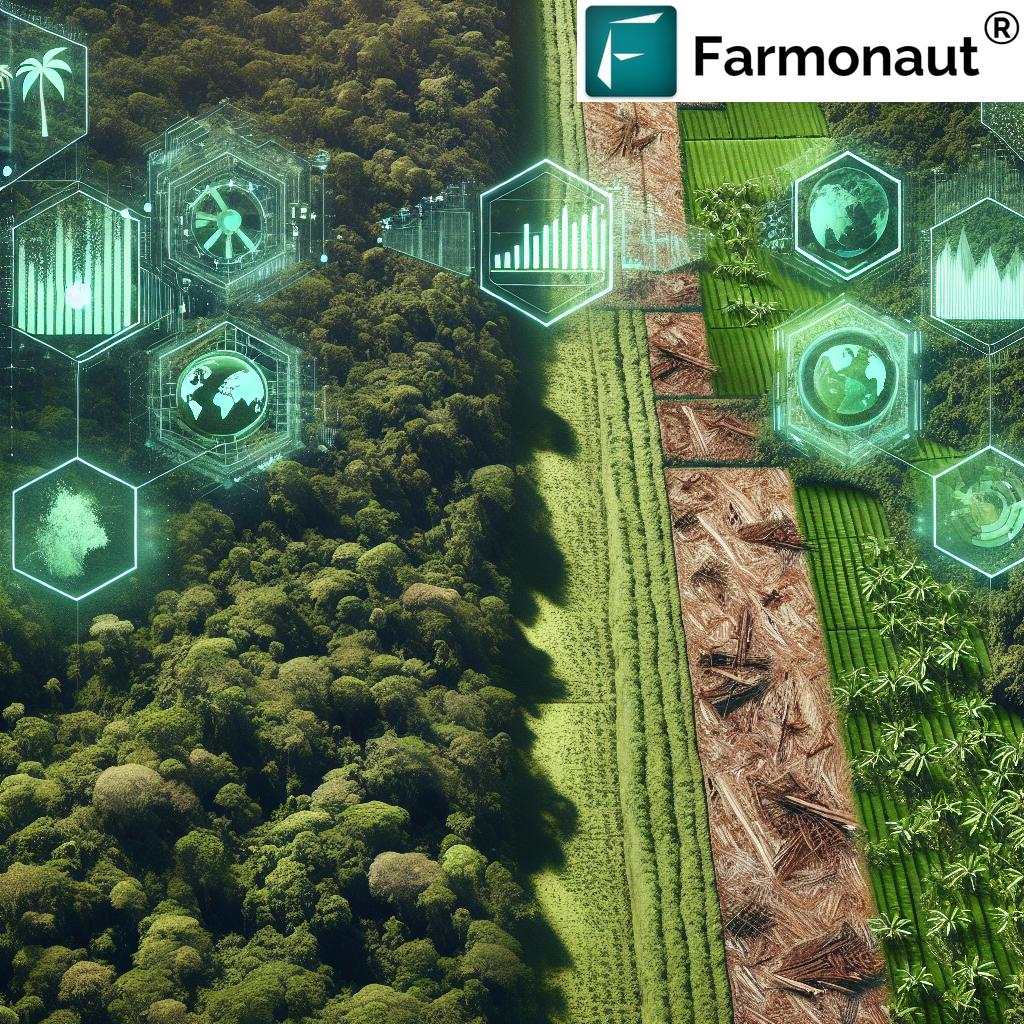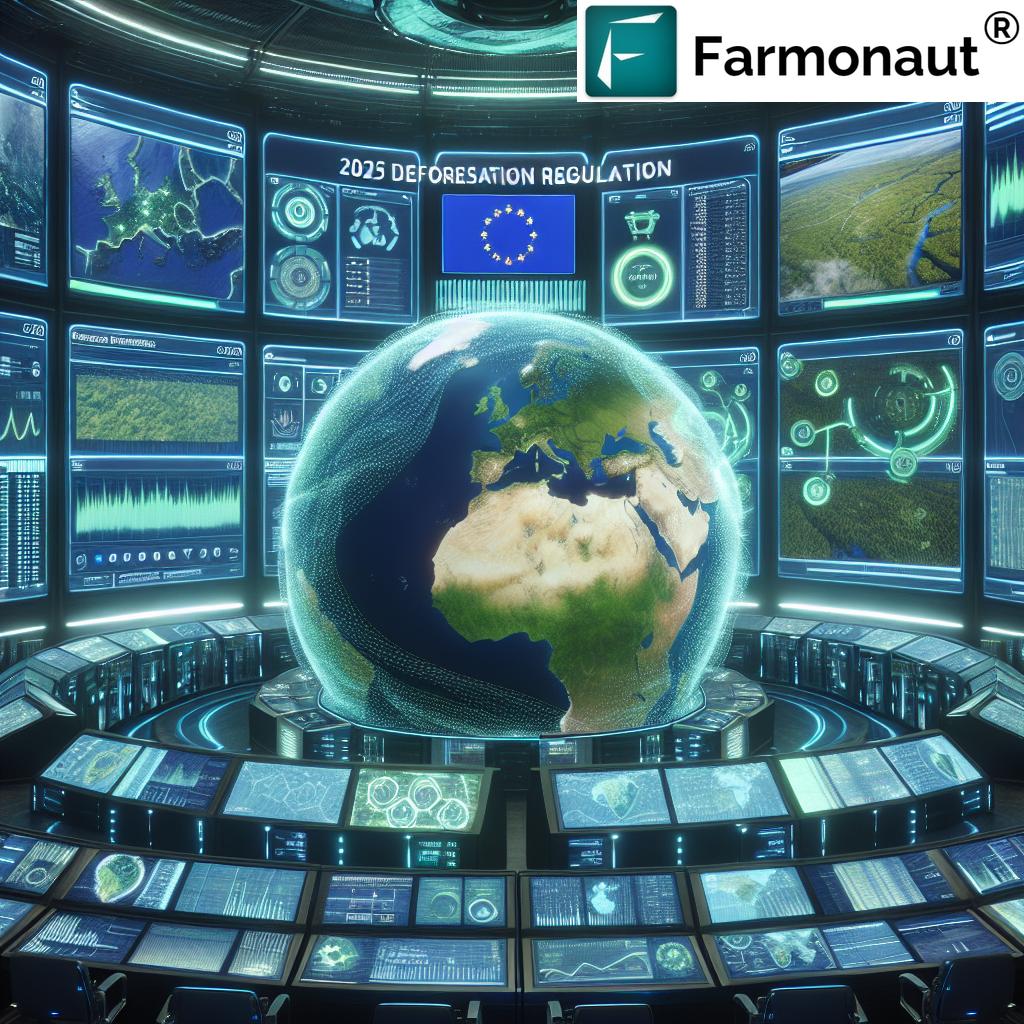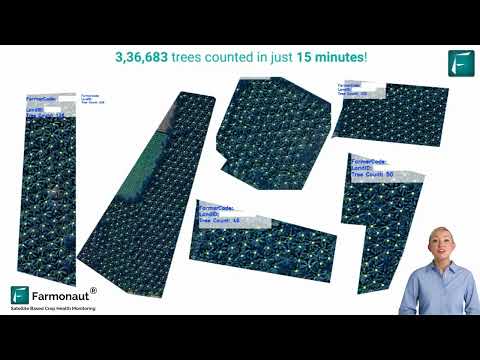EU Deforestation Regulation 2025: How Farmonaut’s Agritech Ensures Sustainable Supply Chain Transparency

“The EU Deforestation Regulation, affecting industries from palm oil to textiles, will be fully implemented on December 30, 2025.”
In the ever-evolving landscape of global agriculture and environmental conservation, a groundbreaking regulation is set to reshape the way we approach sustainable supply chains. The EU Deforestation Regulation (EUDR), slated for full implementation on December 30, 2025, marks a pivotal moment in our collective journey towards deforestation-free sourcing and global forest conservation. As we stand on the brink of this transformative era, it’s crucial to understand the implications of this regulation and explore how innovative agritech solutions, such as those offered by Farmonaut, are poised to play a vital role in ensuring compliance and transparency.
In this comprehensive exploration, we’ll delve into the intricacies of the EUDR, its impact on various industries, and how Farmonaut’s cutting-edge technology is revolutionizing supply chain management in agriculture. From the lush palm oil plantations of Southeast Asia to the cocoa farms of West Africa, we’ll uncover how this regulation is reshaping global commodity production and trade. Join us as we navigate through the challenges and opportunities presented by this landmark legislation, and discover how agritech is paving the way for a more sustainable and transparent future in agriculture.
Understanding the EU Deforestation Regulation
The EU Deforestation Regulation represents a significant leap forward in the global fight against deforestation. At its core, this regulation aims to ensure that products sold in the EU market are not contributing to deforestation or forest degradation. This ambitious goal encompasses a wide range of agricultural commodities and their derived products, including:
- Palm oil
- Soy
- Coffee
- Cocoa
- Timber
- Rubber
- Cattle
The regulation extends its reach to various industries, from retail and textiles to cosmetics and biofuel production. This comprehensive approach underscores the EU’s commitment to addressing deforestation at multiple points in the global supply chain.
Key Requirements of the EUDR
To comply with the EUDR, companies must implement robust due diligence systems that ensure their products are deforestation-free. This involves:
- Information Collection: Gathering detailed data on the production and sourcing of commodities.
- Risk Assessment: Evaluating the risk of deforestation in supply chains.
- Risk Mitigation: Implementing measures to address identified risks.
- Reporting: Regular disclosure of due diligence efforts and results.
These requirements necessitate a level of supply chain transparency and traceability that many companies have yet to achieve. This is where innovative agritech solutions, like those provided by Farmonaut, become invaluable.
Farmonaut’s Role in Ensuring EUDR Compliance
As we navigate the complexities of the EUDR, Farmonaut emerges as a crucial ally for businesses striving to achieve compliance. Our advanced agritech solutions offer a comprehensive suite of tools designed to enhance supply chain transparency and support sustainable agricultural practices.
Satellite-Based Crop Monitoring
At the heart of Farmonaut’s offerings is our state-of-the-art satellite-based crop monitoring system. This technology provides real-time insights into:
- Crop health and growth patterns
- Land use changes
- Deforestation risks
By leveraging multispectral satellite imagery, we enable companies to track and verify the origins of their agricultural commodities with unprecedented accuracy. This capability is crucial for demonstrating compliance with the EUDR’s stringent requirements for deforestation-free sourcing.
Explore our satellite-based solutions: Farmonaut Satellite API
Blockchain-Based Traceability
Farmonaut’s blockchain technology offers an immutable record of a product’s journey from farm to consumer. This level of traceability is essential for:
- Verifying the origin of commodities
- Ensuring transparency throughout the supply chain
- Building trust with consumers and regulatory bodies
Our blockchain solutions provide a robust framework for companies to demonstrate compliance with the EUDR’s requirements for transparent and deforestation-free supply chains.
AI-Powered Risk Assessment
Farmonaut’s Jeevn AI advisory system goes beyond simple monitoring. It employs advanced algorithms to:
- Analyze satellite data and environmental indicators
- Identify potential deforestation risks
- Provide actionable insights for risk mitigation
This proactive approach allows companies to address potential compliance issues before they escalate, ensuring ongoing alignment with EUDR requirements.
For detailed information on our API capabilities, visit our API Developer Docs.
Impact on Key Agricultural Commodities
The EUDR’s implementation will have far-reaching effects on various agricultural sectors. Let’s examine how some key commodities will be impacted and how Farmonaut’s solutions can support compliance efforts:
| Commodity | Estimated Annual EU Import Volume (tons) | Primary Producing Countries | Deforestation Risk Level | Proposed EUDR Compliance Measures | Farmonaut’s Agritech Solutions for Compliance |
|---|---|---|---|---|---|
| Palm Oil | 6.5 million | Indonesia, Malaysia | High | Satellite monitoring, supply chain traceability | Satellite-based crop monitoring, blockchain traceability |
| Cocoa | 1.5 million | Côte d’Ivoire, Ghana | Medium | Farm mapping, deforestation risk assessment | AI-powered risk assessment, satellite imagery analysis |
| Timber | 20 million | Russia, USA, Ukraine | Medium | Chain of custody certification, legal origin verification | Blockchain-based traceability, satellite forest monitoring |
| Soy | 35 million | Brazil, USA, Argentina | High | Zero-deforestation commitments, land use monitoring | Satellite crop monitoring, AI-driven land use change detection |
| Coffee | 3 million | Brazil, Vietnam, Colombia | Low to Medium | Sustainable certification, origin tracing | Blockchain traceability, satellite-based farm verification |
Palm Oil: A Case Study in Compliance
The palm oil industry, known for its significant environmental impact, faces particular scrutiny under the EUDR. Farmonaut’s solutions offer:
- Precise mapping of palm oil plantations
- Real-time monitoring of land use changes
- Blockchain-based traceability from plantation to product
These tools enable palm oil producers and importers to demonstrate compliance with EUDR requirements, ensuring that their products are sourced from deforestation-free areas.
Cocoa: Enhancing Sustainability in Smallholder Farming
The cocoa industry, dominated by smallholder farmers, presents unique challenges for EUDR compliance. Farmonaut’s technology supports:
- Mapping and monitoring of small cocoa farms
- Risk assessment for deforestation in cocoa-growing regions
- Traceability solutions tailored to smallholder supply chains
By providing these tools, we empower cocoa producers to meet EUDR standards while supporting sustainable livelihoods for smallholder farmers.

Beyond Agriculture: EUDR’s Impact on Related Industries
The reach of the EUDR extends far beyond primary agricultural production, affecting a wide range of industries that rely on these commodities. Let’s explore how some of these sectors are adapting to the new regulations and how Farmonaut’s agritech solutions can support their compliance efforts:
Textiles and Leather
The textile and leather industries, significant consumers of agricultural products like cotton and cattle hides, face unique challenges under the EUDR. These sectors must now ensure that their raw materials are sourced from deforestation-free areas. Farmonaut’s solutions offer:
- Satellite monitoring of cotton fields and grazing lands
- Blockchain-based traceability for textile and leather supply chains
- AI-driven risk assessment for deforestation in sourcing regions
By implementing these technologies, textile and leather companies can verify the sustainability of their raw materials and demonstrate compliance with EUDR requirements.
Cosmetics and Personal Care
The cosmetics industry, which relies heavily on palm oil and other plant-based ingredients, must adapt to ensure its supply chains are deforestation-free. Farmonaut’s agritech solutions support this sector by providing:
- Detailed mapping and monitoring of ingredient sources
- Traceability systems for complex, multi-ingredient products
- Risk assessment tools for identifying potential deforestation hotspots
These capabilities enable cosmetics companies to maintain transparency in their supply chains and build consumer trust in their sustainability efforts.
Biofuels
The biofuel industry, which uses crops like soy and palm oil, faces significant scrutiny under the EUDR. Farmonaut’s technology assists this sector by offering:
- Satellite-based monitoring of biofuel crop production
- Land use change detection to prevent deforestation for crop expansion
- Blockchain solutions for tracking the origin and processing of biofuel feedstocks
These tools enable biofuel producers to demonstrate the sustainability of their products and comply with the stringent requirements of the EUDR.
The Role of Technology in Ensuring EUDR Compliance
As we navigate the complexities of the EU Deforestation Regulation, it becomes increasingly clear that technology will play a pivotal role in ensuring compliance and promoting sustainable practices. Farmonaut’s suite of agritech solutions stands at the forefront of this technological revolution, offering innovative tools that address the key challenges posed by the EUDR.
Satellite Imagery and Remote Sensing
Satellite technology forms the backbone of Farmonaut’s approach to monitoring and verifying land use. Our advanced satellite imagery capabilities provide:
- High-resolution mapping of agricultural areas and forests
- Real-time detection of land use changes and potential deforestation
- Multispectral analysis for assessing crop health and environmental impacts
These capabilities are crucial for companies seeking to demonstrate that their supply chains are free from deforestation, as required by the EUDR.
“The Forest 500 initiative benchmarks sustainability practices of businesses, driving eco-friendly improvements across global supply chains.”
Artificial Intelligence and Machine Learning
Farmonaut’s AI-driven solutions, including our Jeevn AI advisory system, leverage machine learning algorithms to:
- Analyze vast amounts of satellite and environmental data
- Predict potential deforestation risks before they occur
- Provide actionable insights for sustainable land management
This proactive approach enables companies to address potential compliance issues early, ensuring ongoing alignment with EUDR requirements.
Blockchain Technology for Supply Chain Transparency
Blockchain forms a critical component of Farmonaut’s traceability solutions, offering:
- Immutable records of product origins and processing
- End-to-end supply chain visibility
- Secure and transparent data sharing among supply chain partners
By implementing blockchain technology, companies can create a verifiable and transparent record of their supply chains, meeting the EUDR’s stringent requirements for traceability and due diligence.
Implementing Farmonaut’s Solutions for EUDR Compliance
For companies looking to leverage Farmonaut’s technology to ensure compliance with the EU Deforestation Regulation, we offer a range of flexible solutions accessible through various platforms:
- Web Application: Our comprehensive web platform provides access to all of Farmonaut’s features, including satellite monitoring, AI-driven insights, and blockchain traceability tools.
- Mobile Applications: For on-the-go access and field-level data collection, our mobile apps offer a streamlined interface to key features.
- API Integration: For businesses looking to integrate Farmonaut’s capabilities into their existing systems, our robust API offers flexible data access and analysis options.
To get started with Farmonaut’s solutions, consider the following options:
The Future of Sustainable Supply Chains
As we look towards the full implementation of the EU Deforestation Regulation in 2025, it’s clear that the landscape of global trade and agricultural production is set for a significant transformation. The EUDR represents not just a regulatory challenge, but an opportunity to reshape our approach to sustainable supply chains and global forest conservation.
Farmonaut’s agritech solutions are at the forefront of this transformation, offering the tools and technologies needed to meet the stringent requirements of the EUDR while promoting more sustainable and transparent agricultural practices. By leveraging satellite technology, AI, and blockchain, we’re empowering businesses to:
- Achieve full supply chain transparency
- Mitigate deforestation risks
- Demonstrate compliance with regulatory requirements
- Build consumer trust through verifiable sustainability claims
As we move towards this new era of sustainable agriculture and responsible sourcing, Farmonaut remains committed to innovation and continuous improvement. Our goal is to make precision agriculture and supply chain transparency accessible to businesses of all sizes, ensuring that the benefits of sustainable practices can be realized across the global agricultural sector.
Conclusion
The EU Deforestation Regulation represents a pivotal moment in our collective effort to combat global deforestation and promote sustainable agricultural practices. As businesses around the world prepare for its implementation, the role of innovative agritech solutions becomes increasingly crucial.
Farmonaut stands ready to support this transition, offering a comprehensive suite of tools designed to ensure compliance, enhance transparency, and promote sustainable practices across the agricultural supply chain. From satellite-based crop monitoring to blockchain-enabled traceability, our solutions provide the technological foundation needed to meet the challenges and opportunities presented by the EUDR.
As we look to the future, it’s clear that the path to truly sustainable and deforestation-free supply chains will require ongoing innovation, collaboration, and commitment. With Farmonaut’s agritech solutions, businesses can not only meet regulatory requirements but also lead the way in creating a more sustainable and transparent global agricultural system.
Together, we can build a future where agricultural productivity and environmental conservation go hand in hand, ensuring a sustainable and prosperous world for generations to come.
FAQ Section
Q: What is the EU Deforestation Regulation (EUDR)?
A: The EUDR is a regulation set to be fully implemented on December 30, 2025, aimed at ensuring that products sold in the EU market do not contribute to deforestation or forest degradation.
Q: Which commodities are affected by the EUDR?
A: The regulation covers a range of agricultural commodities including palm oil, soy, coffee, cocoa, timber, rubber, and cattle products.
Q: How can Farmonaut’s technology help with EUDR compliance?
A: Farmonaut offers satellite-based crop monitoring, blockchain traceability, and AI-powered risk assessment tools that help companies verify the sustainability of their supply chains and demonstrate compliance with EUDR requirements.
Q: Is Farmonaut’s technology suitable for small-scale farmers?
A: Yes, Farmonaut’s solutions are designed to be accessible and affordable for farms of all sizes, including smallholder operations.
Q: How does blockchain technology contribute to supply chain transparency?
A: Blockchain creates an immutable record of a product’s journey from farm to consumer, ensuring transparency and traceability throughout the supply chain.
Q: Can Farmonaut’s solutions be integrated with existing supply chain management systems?
A: Yes, Farmonaut offers API integration options that allow businesses to incorporate our technology into their existing systems seamlessly.






